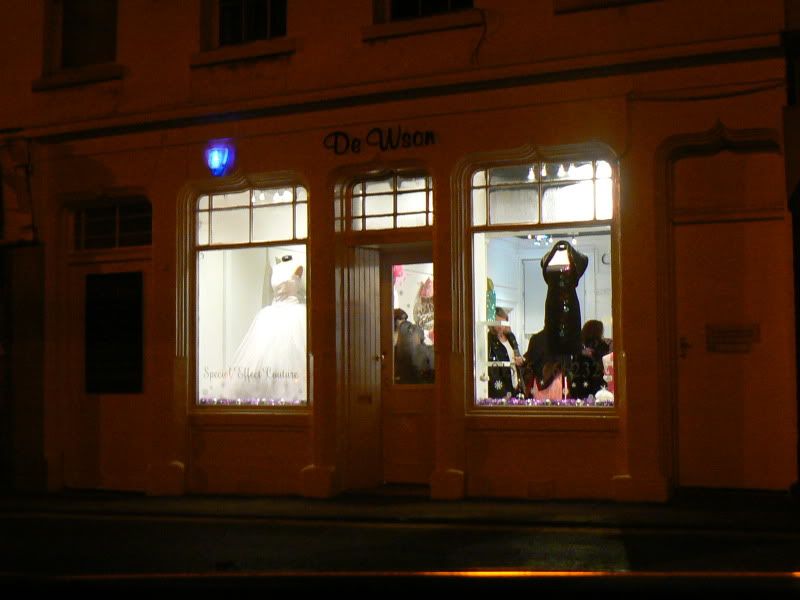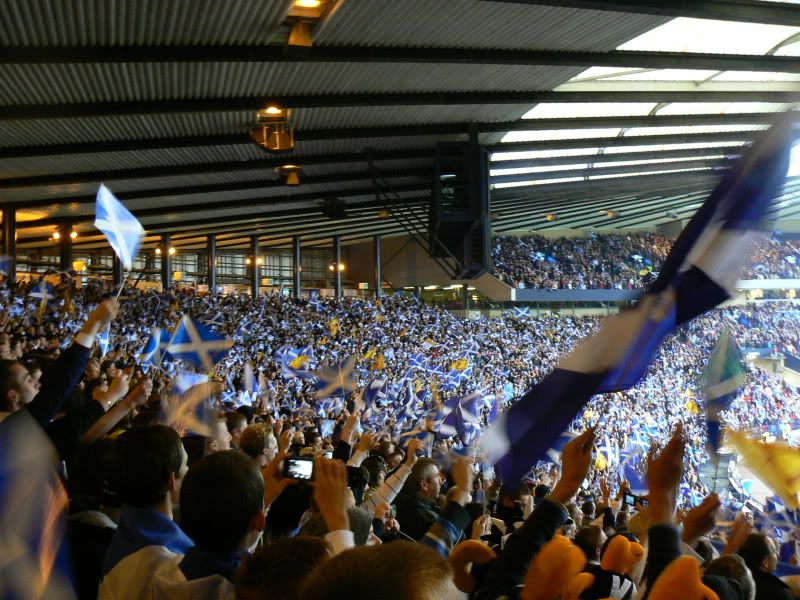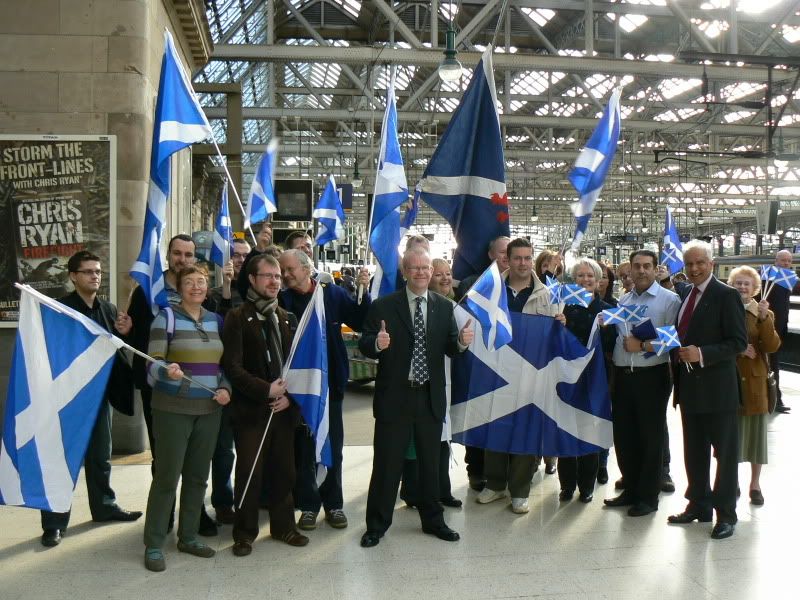Following on from the admission in my previous post, I thought I'd share the experiences of our trip to Paris. I bought the
Rough Guide to Paris before going, but feel there's something just slightly lacking from it - a value-for-money, cost-benefit analysis of the sites and restaurants.
I suppose a lot of this depends on what you like to do - if you find art galleries a bore, you wouldn't waste money on going. Even within the theme of art galleries, there are plenty whose collections wouldn't inspire me. That said, here follows my day-by-day guide to what we saw and whether it's worth doing.
Thursday: arrival in ParisWe got the
Easyjet flight from Glasgow to
CDG. Handy on a short trip as you don't need to change in London. We got the
RER train (sadly from the furthest point in the terminal building!) into Gare
du Nord. It cost 8 euros, which is pretty unavoidable! What is worth checking though is whether it's the fast train, which goes straight through, or the train that stops at every station.
We arrived at Gare
du Nord, found our way through this massive station and headed to the nearby
Hotel Francais, which Joe had booked on
Expedia. It was really nice - the rooms weren't huge or anything, but it was fine for us. Well located for exploring as well, with some wee cafes nearby. We had
croque monsieur and a beer for lunch in one, another did a cheap croissant/coffee combo to take away for breakfast. There was also a small supermarket, where we skimped by buying food and wine to have in our room. We used our minibar for storing cheese and chocolate!
Drinking out in Paris costs a fortune - five euros in some places just for a coke - so we ended up mostly staying at night. Since Paris seemed to us mostly upstairs and uphill, we ended up totally knackered each evening anyway!
After buying a
carnet of tickets, our first trip was to the
Musee d'Orsay, which I love. I'd been before, about ten years ago, and felt I'd like to go back. It's open late until 9.45pm on a Thursday night, and has a reduced fee (7 euros) if you go after 6pm. This was just about enough time to
wheech round and see all my favourites - Degas, Cezanne, Monet, Renoir,
Sisley, Van
Gogh,
Morisot. I've always loved being able to see the impressionists works close up, to see the brush strokes and the way the paint or pastel has been applied. Seeing paintings like
Manet's Le déjeuner sur l'herbe for real is well worth it! There's lots of furniture there as well, incredibly beautiful Art
Nouveau pieces. We had a bite to eat in the cafe (chocolate cake for me, soup for Joe), which was about all we could afford! Despite that, the entry fee is pretty good value for Paris, and there's a lot to see here.
Friday: touristy stuff
The "must do" thing for Paris is surely to visit the
Eiffel Tower. I'd seen it from below, but hadn't ventured up on my last trip, put off by the queues. We opted for the stairs, as the queues were non-
existent, and the fee was 4.50 euros compared to 8 for the lift. For those more daring than me, going all the way to the top costs 13 euros. The climb wasn't as arduous as I'd feared - it must be all the practice leafleting tenements - and information boards on the way up gave you and excuse to pause for a few minutes. There are exhibitions and a cinema on the first floor, as well as a restaurant and a cafe. We stopped for to have an beer, as it was the same price as a soft drink! The information panels were pretty well done and interesting. The second floor was also pretty good, and of course the views were incredible. I could have watched Paris stretching out into the distance for hours!
Once we'd had our fill, it was back down the steps on increasingly shaky legs to find some lunch.
The
Ille de Cite and
Notre Dame came next. These were quite pretty to look around, although because the police are based there there was a lot of siren noise!
Notre Dame was very pretty, with beautiful stained glass. It was free to get in, and you could stay, have a seat and contemplate for as long as you liked.
For dinner, we headed over past the town hall towards the
Pompidou Centre. It's a very unusual modern building, as all the
gubbins usually hidden inside a building is on the outside. Pipes, ducts, wires, even the escalators can be seen running along the faces of the building. We didn't have time to go in, but it looked worth a visit.
Following the guidebook, we headed to
Au Chien Qui Fume for dinner. It was a bit odd, with pastiches of famous paintings where the people were
substituted for dogs, but the food was tasty and in generous portions. After, I got an ice cream cone from a stall and we headed back to the hotel.
Saturday: Paris when it drizzles
It's not easy being a tourist when it's raining, but the best thing to do is find
indoorsy things quite close together. We chose the Arc
de Triomphe (as it has an exhibition) and the Louvre (as it's massive). As a break from the monotony of the metro system, we decided to try the bus from outside our hotel at the Gare
de L'Est to Charles
de Gaulle Etoile. The bus runs past the
Moulin Rouge, among other sights.
The
Arc de Triomphe entry fee was 9 euros. The exhibition had changed since I last visited, moving from black and white photos of the history of the monument to three video shows. One of these wasn't working, but the other two were interesting enough, showing the original plans and footage of the monument through history. Up top, it was wet and slippy, so we didn't linger too long. I think it might have been better to come at night to get a different perspective than we had from visiting the Eiffel Tower. For what you get, the entry fee isn't great value and there's not a lot extra to make it worth your while.
We left there and wandered all the way down the Champs
Elysees, through Place
de la Concorde into the
Tuileries Gardens. These were pleasant, if a bit soggy. I can imagine that it would be lovely with a bit more sun! We had lunch at one of the cafes there, although sadly the one recommended in the Rough Guide appeared to have vanished since publication. Bit costly for a hunk of bread and a beer (around the 18 euro mark), but we were ravenous by this stage.
The Louvre was quite impressive, not least for the glass pyramid, which was much bigger than I expected! The admission was 9 euros - the same as the Arc
de Triomphe - which gives you access to the whole museum. There's reduced prices for access for the evening, and in common with most in Paris, free entrance for 18-25 year
olds.
The 'big hitters' here are of course the Mona Lisa and the Venus
de Milo, but there's plenty more to see. There's a huge collection of Egyptian antiquities, from the largest
sarcophagus to the smallest pair of earrings. I'm a wee bit uncomfortable with such significant collections being
permanent -
perhaps best kept in Egypt for their own people to enjoy - but it certainly is worth seeing. I'm fascinated that despite so much time standing between us, many of the everyday objects of Egyptian life are still so similar and familiar. There are paintings and sculptures, not all to my interest or taste, but interesting nonetheless. The Mona Lisa puzzles me a little - whatever the world's attraction to this small painting is, I'm not sure I share it. I went to have a look, of course, but I much prefer the paintings by artists I mentioned previously. I was slightly amused by the throng of tourists, there to dash round, ignore most of the rest of the museums works and get their picture taken with Leonardo
da Vinci's work.
The Louvre overwhelmed us a bit; on our way out we took a wrong turn and found ourselves in an attached underground shopping mall. Eventually, we struggled back to the surface and set about finding refreshment. We had a nice beer in a pub as we checked the guide book and lamented the prices of the food. On our way for dinner, we discovered a pub full of animal rights demonstrators with a happy hour. We toasted this luck and researched further. Eventually, after wandering slightly lost down some pretty arcades, we stumbled across a very cheap Italian restaurant. Smoked salmon, pizza and
tiramisu, washed down by a carafe of red wine. Win.
Sunday: war and peaceJoe had decided we'd done quite enough looking at paintings, so we went off to the
Army Museum at Les Invalides (entry 8.50 euros). I wasn't optimistic, particularly as I'm not hugely keen on the endless cases of guns, uniforms and medals which the French tend to go in for at these things. The first section we went into didn't assuage my fears, as it was case after case of mementos from Resistance heroes, with small labels typed in French. The other part of the museum was far more modern, and really quite interesting. There was a very detailed
walkthrough exhibition for the First and Second World Wars, with
artifacts, videos with subtitles, and maps. Particularly useful was a projection of the movement of forces in France during WWI. There was a lot of information on the resistance, and I feel I left a little wiser. Other exhibitions in the museum included one on
de Gaulle, a room of models of French forts, and Napoleon's tomb. Rather good value for money this one too.
Following this, we headed off to
Monmartre for a bit of exploring. I'd checked out beforehand the location of the cafe in Amelie, and we stopped by for a quick espresso at the bar. I'd expected it to be mobbed, but it was pleasant and the staff worked around the star struck tourists snapping away. It didn't look like they'd particularly inflated their prices either, which is nice.
We found our way up to
Sacre Coeur, which really is quite stunning. The view across the city is amazing, and you really see how far up you've walked! Inside, we sat and listened to the end of a service and the choir.
We wandered around a little more, and watched the sun set over the city. Walked down the steps by the funicular, and found that two of the restaurants we fancied were shut on a Sunday. Fortunately, one other was open, and it turned out to be pretty good. I had giant salad - pretty much the size of bowl my mum would put on the table for four of us to share! It was covered in potatoes, sliced like thick crisps. Very filling, but really nice. The place had a great atmosphere, upstairs, downstairs and a back room all full, everyone seated very close together.
Monday: time to go homeOur flight was at lunchtime, so there was no time to do any sightseeing before we left. Negotiated our way through Gare
du Nord, slight panic at trains being delayed, but arrived at the airport in plenty of time. We had some cheese still left over and so bought some bread to have ourselves a messy picnic in the airport. The other travellers looked on with bemused jealousy!
It was so nice to get away together and I really enjoyed the break. I've got my head down now and working away til Christmas!
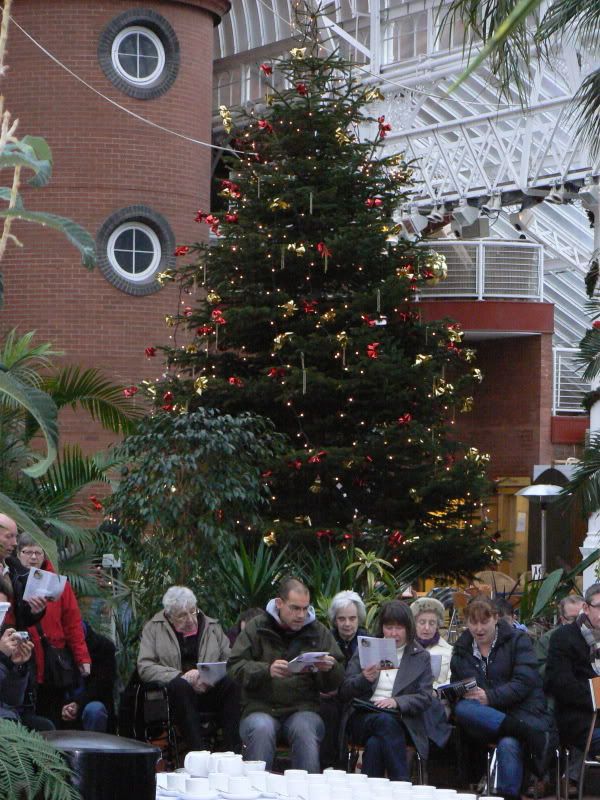 Things have been pretty hectic since my last post - Christmas has arrived and, as usual, caught me completely by surprise. I can finally blog now, having gotten all my Christmas cards written and posted out. Instead of sending the standard Council one, I took some pictures of the Christmas lights around my ward, and with some help via the wonders of technology, they turned out quite well. If one pops through your door, I hope you like it!
Things have been pretty hectic since my last post - Christmas has arrived and, as usual, caught me completely by surprise. I can finally blog now, having gotten all my Christmas cards written and posted out. Instead of sending the standard Council one, I took some pictures of the Christmas lights around my ward, and with some help via the wonders of technology, they turned out quite well. If one pops through your door, I hope you like it! 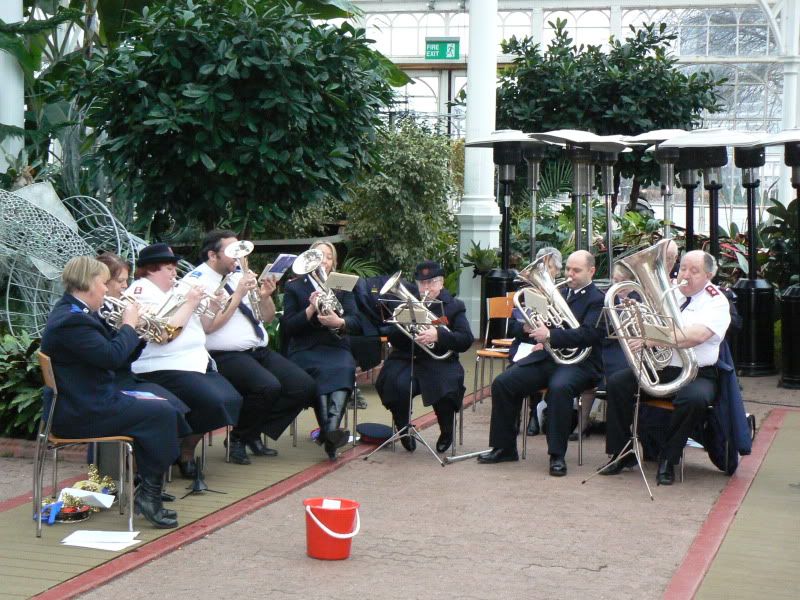 On Saturday, I attended a Christmas Carol Concert in the Winter Gardens of the People's Palace on Glasgow Green.
On Saturday, I attended a Christmas Carol Concert in the Winter Gardens of the People's Palace on Glasgow Green.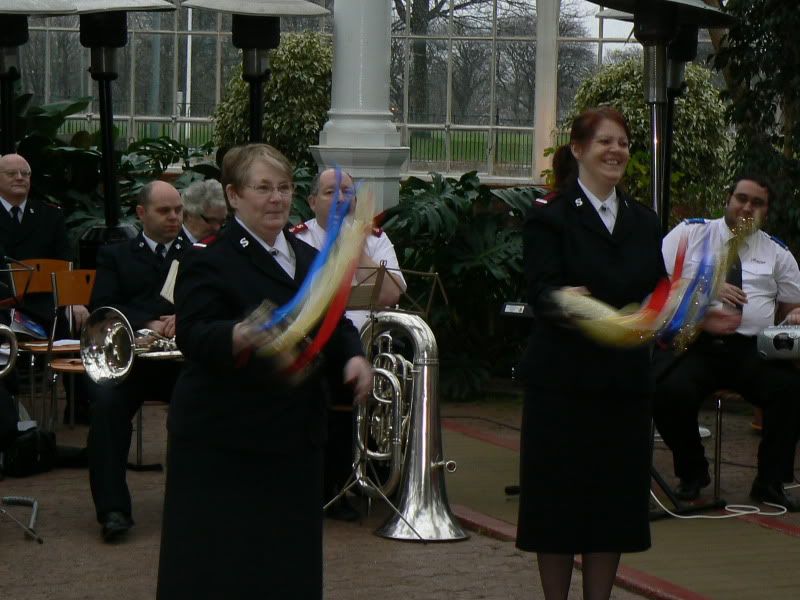 People visiting seemed quite taken with the whole thing, and the Band said they'd be willing to come back next year.
People visiting seemed quite taken with the whole thing, and the Band said they'd be willing to come back next year.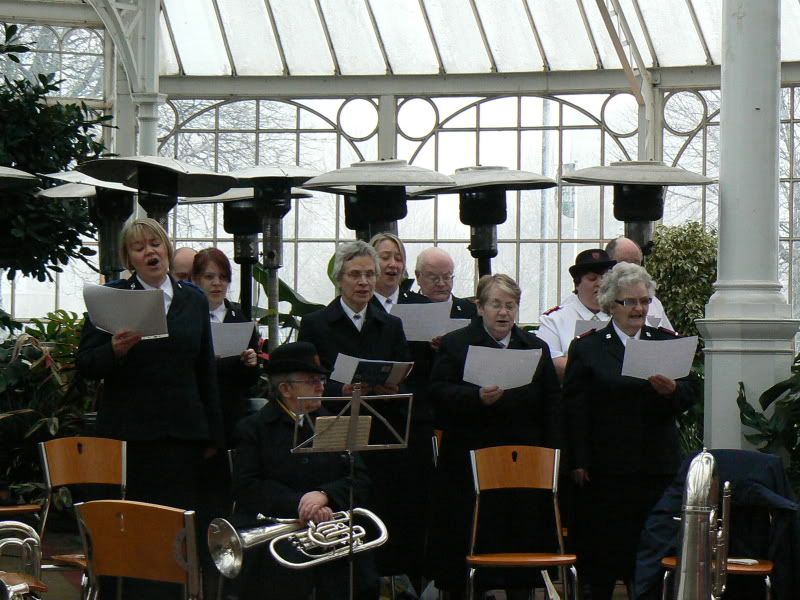 The most magical moment came when the glasshouse turned into an inverted snow dome as a blizzard whipped up outside; it was almost as if the band had summoned the weather!
The most magical moment came when the glasshouse turned into an inverted snow dome as a blizzard whipped up outside; it was almost as if the band had summoned the weather!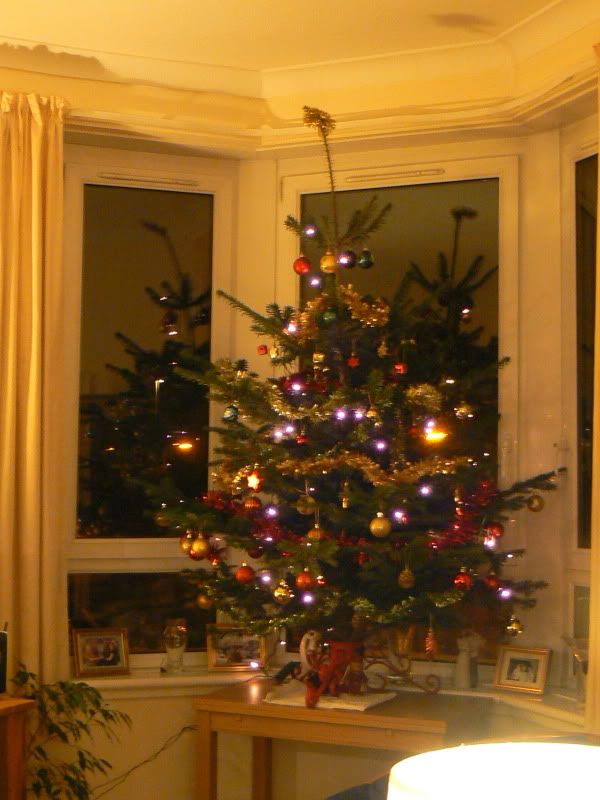 I finally got my tree up on Saturday night - Michael, this picture's for you.
I finally got my tree up on Saturday night - Michael, this picture's for you.
